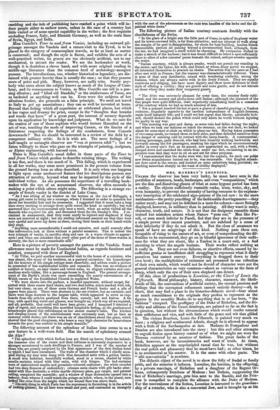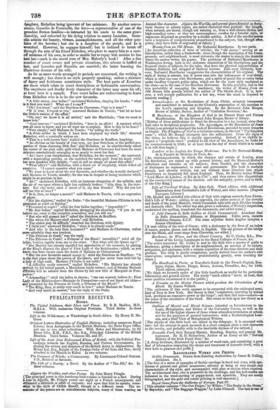MRS. MABERLY'S LEONTINE.
UNLESS the observer has been very lucky, he must have seen in the portfolios of amateurs, heads, landscapes, and even " compositions," which are the dim and dissolving ghosts of what at some bygone period has been a reality. The objects sufficiently resemble rocks, trees, water, sky, and even humanity, to prevent the necessity of having recourse to the explana- tory inscription of the celebrated sign-painter of the red cow : in the mere mechanism—the pretty penciffing of the fashionable drawingmaster—they rather excel; and may not be deficientin a taste for colours—more fittingly- displayed, however, in millinery than in painting. All they want is unity, character, truth, and nature. It is not that the designers resemble those trained but mistaken artists whom Nature "puts out." Men like Pu- seli, or men much inferior to Fuseli, feel that they are in the presence Of a simple power they cannot penetrate, and are subdued by a sense of their inferiority if they do not admit it. But the class of amateurs we speak of have no misgivings of this kind. Nothing puts them oat. Incapable of rising to the nature of art, or even of comprehending the dif- ficulties to be encountered, they go on in blissful ignorance of their unfit- ness for what they are about, like a Yankee in a court suit, or a foot strutting in where the angels hesitate. Their works reflect nothing as, it really is. They are not even failures, or abortive efforts, caused by in- sufficient genies or insufficient skill struggling to represent what it dimly perceives but cannot convey. Everything is dragged down to their own level ; the multiplicities of existence are presented in one reflection of their own minds, which would not be devoid of character were not the general characteristics so very common—about as various as the faces of sheep, which only the eye of their own shepherd can detect. Of this class of productions is Leontine, or the Court of Louis the, Fifteenth. Moral philosophy, history, character, manners, the likeli- hoods of life, the conventions of artificial society, the eternal passions and feelings that the corruptest refinement cannot entirely destroy—all, in short, that may find a place in the historico-didactic novel—bear about as much resemblance to the originals they profess to represent as the figures in the monthly Modes do to anything that is or has been, " the fashions " excepted. The profligacy of the Duke of Richelieu, and the fri- volity and silliness of the Court demireps, are painted so far as the fact is in question, but without the circumstances which would render natural their selfishness and vice, and with little of the grace and wit that gilded it. The vicious Bourbon, Louis the Fifteenth, is painted very much en beau; a religious and sentimental Adonis, though he is allowed to appear with a little of the Sardanapalus at last. Madame de Pompadour and Damien are also introduced into the story : but this and other attempts to engraft fiction upon history remind us of what we might see were the Theseus restored by an amateur of fashion. The great faults of the book, however, are its inconsistencies and want of truth. At times, Richelieu appears as the unprincipled rascal that he was, but without the real polish and pleasantry that he must have had ; at other times, he is as sentimental as his master. It is the same with other parts. The " si6i convenientia" is nowhere.
The didactic object of the novel is to show the folly of feudal or family pride, and the miseries it induces. Leontine, the heroine, is the offspring, by a private marriage, of Richelieu and a daughter of the Regent Or- leans, subsequently Datchess of Modena : but Dubois, suppressing the fact of Richelieu's marriage, gets him sent to the Bastile, and the Prin- cess is compelled to complete the alliance with the Duke of Modena. For the convenience of the fiction, Leontine is intrusted to the guardian- ship of a roturier, who is also a converted Jew, and is brought up as his
daughter, Richelieu being ignorant of her existence. By another conve- nience, Guesclin de Fontenelle, the hero—a representative of one of the proudest Breton families—is intrusted by his uncle to the same guar- dianship, and exhorted by his dying relation to marry Leontine. Gues- clin admits the' beauty, virtues, accomplishments, and all the other qua- lities of the heroine ; but she is a daughter of the people, and he is wretched. However, he engages himself; but is induced to break off through the arts of his friend Richelieu, who plots to marry him to a cast- off mistress of his own, in order to enable her to repay him monies he has lent her—such is the moral tone of Mrs. Maberly's book! After a due number of court scenes and private situations, this scheme is baffled at last, and Leontine and Guesclin are married ; the latter learning the illustrious descent of his wife.
As far as mere words arranged in periods are concerned, the writing is well enough ; but there is no style properly speaking, unless a mixture Of finery and feebleness constitutes style. The best parts of Leontine ere those which relate to court descriptions or fashionable conversation. The emptiness and deadly lively character of the latter may seem hit off; at least here is a sample. Four court ladies are endeavouring to learn from Richelieu who is to be the new favourite.
"A little mercy, dear ladies !" exclaimed Richelieu, clasping his hands; "what is it that you want? What am I to say? "
" Oh ! you know," said the Dutehess de Chevrense; "but is it tree? " "It is true, I repeat to you," answered Madame de Tencin; "but let us hear the Duke's version of the affair."
"Oh, yea! we know it is all settled," said the Marechale; "but we want to know how."
" Good heavens !" exclaimed Richelieu, " here is an affair ! A mystery which you all seem to know, and yet all want me to explain. How is this to be done? " "Very simply" said Madame de Tencin • "by telling the troth."
"A trine metier in which I have been employed my whole life," observed Richelieu, with a comically serious air. "That is a well-known fact," replied the Dutchess de Bonellers, laughing. "As obvious as the beauty of your eyes, my dear Dutchess, or the perfect pro- portion of these charming little feet," said Richelieu, as he mischievously raised the corner of the pink satin quilt which Madame de Chevrense had been for some minutes ostentatiously arranging so as nearly to cover her feet.
" Ah ! leave your compliments, dear Richelieu, for the moment," she answered, with a deprecating gesture, as she snatched the satin quilt from his hand, while her" eyes sparkled with delight; " and do tell us simply all about this affair."
What affair?" said Richelieu, with a frank air of simplicity, which defied all suspicion. "I cannot conceive what you mean." We want to know about the new favourite, and whether she is really declared," said Madame de Tencin, steadily; for she was in despair at losing moments which might be so precious to her.
" Ah ! " exclaimed Richelieu, with an immense elongation of the syllable, and the air of one upon whom a light has suddenly broken: , this, then, is the mys- terj. But why make such a secret of it, my dear friends? Why did you not ask me this at once? "
" Is it, then, no longer a secret?" said Madame de Tencin, with an expression of pique. "Not the slightest," replied the Duke: "the beautiful Madame d'Etioles is tobe resented at court on Sunday." "Presented at court!" cried the four ladies together; " impossible! " "My dear ladies," replied Richelieu, shrugging his shoulders, "if you do not believe me, come to the reception yourselves, and you Will see." But who will present her ?" asked the Dutchess de Bouffiers.
" She whom his Majesty shall choose," said Richelieu. " The choice may be difficult," observed the Datehess, with di
is dignity.
" I think not," since " answered Richelieu, " it is already made.
" And who s the lady thus honoured? " said Madame de Chevrense, rather more spitefully than was prudent. "The Princess de Conti," was the reply.
"The_ Princess de Conti a Princess of the Blood ! incredible !" cried all the ladies, looking rapidly from one to the other. "But what will the Queen say? " " Her Mteste y has already signified her approbation of the measure, by placing at the Kin s disposal the place of First Lady of the Bedchamber; which, as you know, has been vacant since the death of Madame de Chateauroux."
"But the new favourite cannot accept it," cried the Datehess de Beninese; "it le the first place about the person of the Queen, and has never been held but by a lady of high rank. Madame d'Etioles is not noble." "A difficulty easily removed," replied Richelieu. "His Majesty has already revived, by his letters patent, a Marquisate lately extinct; and on Sunday Madame zrEtioles will be saluted from the throne by her new title of Marquise de Pom- padour."
"Astounding " cried the ladies in chorus; "one can scarcely believe it: First Lady of the Bedchamber—Marquise de Pompadour—one of our finest old titles— and presented by the Princess de Conti, a Prmcess of the Blood !" " The King, then, is really very much in love ?" asked Madame de Tencin. "And very much in earnest," was the reply of the Duke.



























 Previous page
Previous page